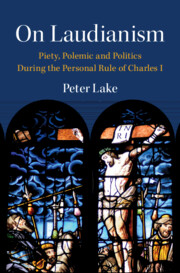Book contents
- On Laudianism
- Cambridge Studies in Early Modern British History
- On Laudianism
- Copyright page
- Contents
- Acknowledgements
- Abbreviations
- Introduction
- Part I Laudianism: Where It Came From
- Part II Laudianism: What It Was
- Part III Laudianism: What It Wasn’t
- Part IV Laudianism and Predestination
- Chapter 26 Laudianism, Puritanism and Arminianism Revisited
- Chapter 27 The Language of Mystery
- Chapter 28 Fatal Necessity
- Chapter 29 Predestination, the Positive Case
- Chapter 30 Faith, Hope and Charity
- Chapter 31 Effort without Merit, Reward without Desert
- Part V Laudianism as Coalition: The Constituent Parts
- Conclusion
- Index
Chapter 27 - The Language of Mystery
from Part IV - Laudianism and Predestination
Published online by Cambridge University Press: 05 October 2023
- On Laudianism
- Cambridge Studies in Early Modern British History
- On Laudianism
- Copyright page
- Contents
- Acknowledgements
- Abbreviations
- Introduction
- Part I Laudianism: Where It Came From
- Part II Laudianism: What It Was
- Part III Laudianism: What It Wasn’t
- Part IV Laudianism and Predestination
- Chapter 26 Laudianism, Puritanism and Arminianism Revisited
- Chapter 27 The Language of Mystery
- Chapter 28 Fatal Necessity
- Chapter 29 Predestination, the Positive Case
- Chapter 30 Faith, Hope and Charity
- Chapter 31 Effort without Merit, Reward without Desert
- Part V Laudianism as Coalition: The Constituent Parts
- Conclusion
- Index
Summary
This chapter explicates the language of mystery, which was one of the Laudians’ preferred modes for treating the topic of predestination. The workings of the divine will were held to be so far above the puny categories of human reason that the process of subjecting the former to the demands of the latter was taken to be in itself a form of the presumption, perhaps even the sacrilege, of which the Laudians so frequently accused the puritans. The fine print of predestination was thus far better left wreathed in the language of mystery, a language that wise divines also used to deal with topics like the Trinity or Christology. There were, the Laudians maintained, central features of the Christian faith which were best simply believed rather than reduced to a list of numbered doctrinal propositions, to be then defended through entirely human procedures of syllogistic reasoning. In some circumstances, and certain moods, the Laudians held predestination to be one of those areas of difficulty, presented by God for human belief, rather than for theological enquiry.
- Type
- Chapter
- Information
- On LaudianismPiety, Polemic and Politics During the Personal Rule of Charles I, pp. 360 - 365Publisher: Cambridge University PressPrint publication year: 2023

